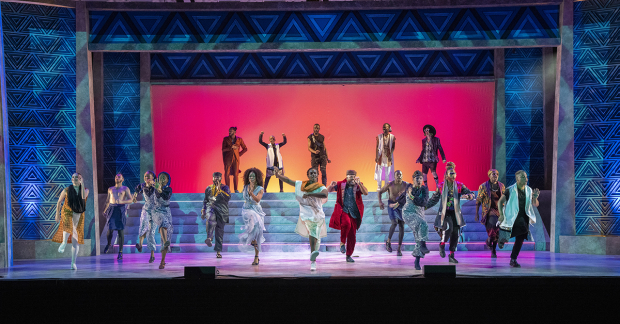Review: Classical Theatre of Harlem Offers a Raucous Twelfth Night Outdoors
Tony nominee Kara Young headlines the free production of Shakespeare’s great gender-bending comedy at Marcus Garvey Park.

(© Richard Termine)
If any Shakespeare play illustrates how durable the Bard's work truly is, Twelfth Night is it. With a plot that revolves around a woman inspiring the affections of both men and women while she moonlights as a man, the play is timelier than ever now, with norms of gender and sexuality continually being challenged. So the Classical Theatre of Harlem's new production of Twelfth Night at Marcus Garvey Park, which officially opened over the weekend, is a welcome way to reintroduce this comedy to a modern audience — even if the production is not all that it could have been.
Director Carl Cofield's chief innovation with his take on Twelfth Night is to give his production an Afrofuturist aesthetic. This makes for an eye-filling production, visually speaking, at the very least. Triangular patterns dominate Riw Rakkulchon's spacey set design, while Mika Eubanks's costume design is chock-full of African-style casual and formal attire, punctuated by Earon Nealey's bob- and weave-heavy hair and wig designs. Lighting designer Alan C. Edwards bathes it all in a sleek panoply of bright and bold colors, giving the production an appropriately futuristic sheen occasionally enhanced by Brittany Bland's trippy abstract projections.
Amid the sci-fi bells and whistles, however, Shakespeare's complicated plot and distinctive vernacular remain the same (the production runs much longer than the website's estimated 90 minutes). Viola (Kara Young), fearing her twin brother Sebastian (J'Laney Allen) dead after they are separated in a shipwreck in Illyria, pines for Duke Orsino (William Demerit) while she's dressed up as the pageboy Cesario; meanwhile, Orsino yearns for Olivia (Christina Sajous), still mourning her own deceased brother, who finds herself drawn to Viola-disguised-as-Cesario while rejecting Orsino's advances. Sebastian, though, turns out to be very much alive, rescued by Antonio (Denzel Fields), whose interactions with him simmer with homoerotic tension. Then there's Maria (Cassandra Lopez), her uncle Sir Toby (Chivas Michael), and squire Sir Andrew Aguecheek (Carson Elrod), who so despise Olivia's steward Malvolio (Allen Gilmore) that they fake a romantic letter from Olivia meant to humiliate him.
Hints of melancholy and thematic heft peek through Shakespeare's surfeit of mistaken identities and double-crosses: Orsino's insistence to Viola/Cesario that there's a difference between love between two men and between a man and a woman; Viola/Cesario refusing to prove her "manhood" by fighting Sir Andrew; Antonio ultimately being left alone in the end after his beloved Sebastian reunites with Viola. Such poignant undertones, however, are given rather short shrift in Cofield's production, which emphasizes raucous comedy at the expense of its underlying pathos. Cofield has directed many of the performers in the large ensemble to go big and broad. You would, for instance, never know Olivia was still in mourning the way Sajous approaches the character, playing up her narcissism; while Gilmore makes Malvolio such a buffoonish fop that there's no sting in the way Maria, Sir Toby and company arguably go too far in ridiculing him. At least the hamminess Lopez, Michael, and Elrod bring to their roles feels appropriate for their comic-relief characters. Even then, though, Cofield has them overemphasize even their bawdiest lines with ribald hand gestures and such. The result is a production that sometimes feels as if it's trying too hard to be funny.
Thankfully, Young grounds the production with a beautifully modulated performance as Viola; alongside her recent Tony-nominated performance in Clyde's, this role demonstrates just how much she deserves to be a star after years of terrific work on New York City stages. Allen is similarly touching as her brother Sebastian; their concluding reunion comes off as genuinely moving in this production. And even if Cofield evinces too heavy a hand for comedy at times, his Twelfth Night at least vibrates with a playful spirit that keeps it fresh and entertaining, exemplified by choreographer Tiffany Rea-Fisher's exuberant interstitial dance sequences and composer-sound designer Frederick Kennedy's R&B-flavored settings for some of Feste's (Israel Erron Ford) songs, complete with Auto-tune. Whatever faults there are in Cofield's production, the brilliance and continuing relevance of Shakespeare's great comedy still shines through.











